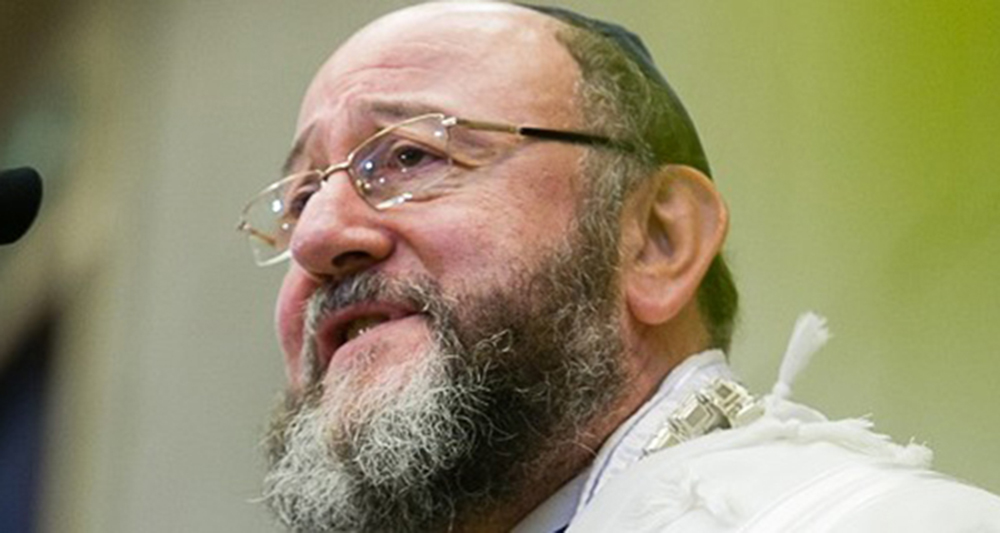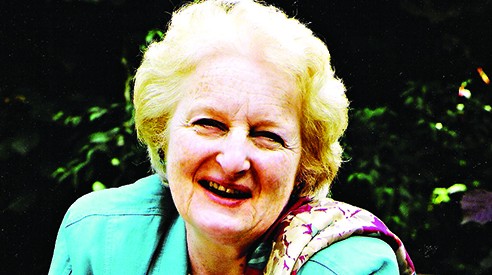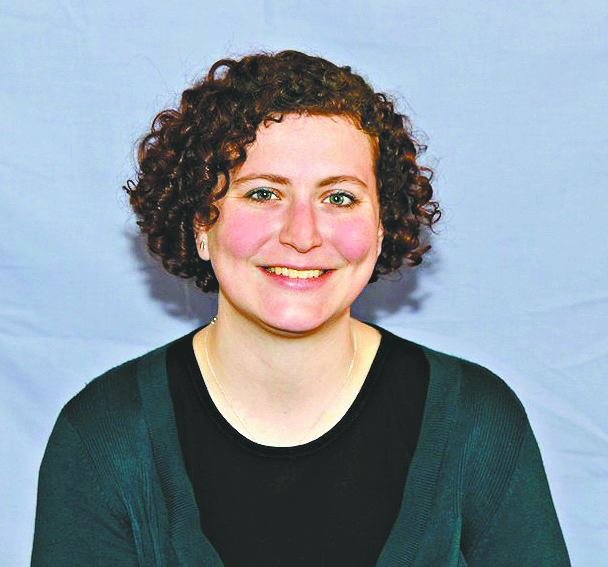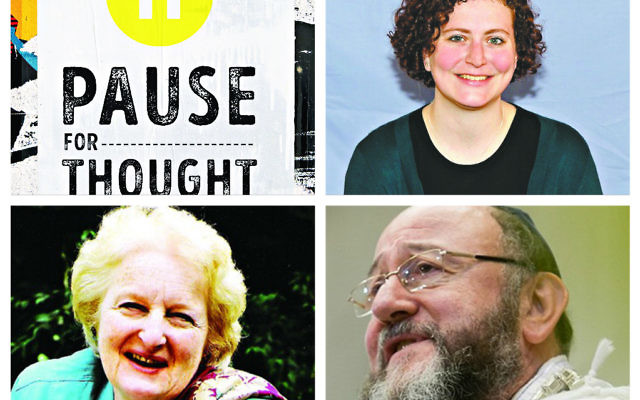Now here’s a thought…
With more than six million listeners, BBC Radio 2’s Pause For Thought provides a place to discuss modern life. Here, we publish three reflections from a new book on the broadcast
Chief Rabbi Ephraim Mirvis, Broadcast 27 November 2013
One of my favourite songs is Who Am I? from Les Misérables. For the ex-convict Jean Valjean, the song is a question of personal identity. His answer, ‘24601’, reflects the limitations that others have placed upon him. Like most people, when I first meet somebody, my instinct is to find a personal connection.
So, who am I? I am a husband, son, brother, father and grandfather. I was born in South Africa. I have lived in Israel, Ireland and now the United Kingdom. I am Jewish and I support Tottenham Hotspur. These multiple aspects of my identity provide a basis on which to find common ground with others and to begin to establish meaningful connections.

Tonight, we Jewish people around the world will light a candle for the first night of Chanukah, which celebrates identity and belonging. In doing so, we will remember how, nearly 2,200 years ago, the Greek Empire sought to force the Jews of ancient Israel to give up their faith and long-held traditions.
In a small outpost in the Holy Land, a band of Jews led by Judah Maccabee wrote themselves into history by defeating the Greek armies — at least temporarily. Greater than their military defeat, though, was what they were fighting for: the right to determine their own identity and to give their own answer to the question “Who am I?”
On Chanukah, we reflect on how we define ourselves and the value of shared identity. Whether as part of a family, a community or a nation, we each have multiple and overlapping identities at our core.
This complex tapestry is hugely significant, adding richness and meaning to our lives; and the more identities we share, the more we find we have in common. However, at the same time there is strength in diversity. Attempts to impose one’s identity on others is counter-productive. If, as individuals, we can appreciate the equal value of those who share our identity and those who don’t, then our combined future will be all the brighter.
So, who am I? Just like you, I’m someone who delights in what we share and who takes great pleasure in what makes us unique.
Rabbi Baroness Julia Neuberger, Senior rabbi to the West London Synagogue, Broadcast 27 April 2015
During the depths of winter, I always bring in the amaryllis bulbs that have been languishing outside on the windowsill since last year, clean their pots and give them a bit of water and fertiliser. Just this last week, they’ve been rewarding me with the most spectacular display of salmon-pink blooms, and they make me smile as I walk into my kitchen. The bulbs were given to me some seven or eight years ago, and yet back they come every year. My flowers give me enormous pleasure.

My children tell me, as I talk to them about my few gardening successes: “Mum, you’re just getting old.” But it’s not just an older person’s pleasure. The emphasis on planting gardens goes back to the Bible. The prophet Jeremiah told the Israelite exiles in Babylon to “Build houses and live in them; plant gardens and eat their produce.” The prophet Isaiah used the metaphor of a vineyard that God had nurtured but which failed to reward its owner with lavish grapes. Faced with only wild, bitter fruit, the owner threatened to uproot the vineyard.
King Ahab took Naboth’s vineyard and used it as a vegetable garden, even though Naboth had refused to sell it. Gardens are everywhere in the Bible and ancient literature. They’re deeply rooted in our way of thinking, whether we’re young or old. And at this time of year they make us all smile, with the feeling that everything is going to be plentiful once again.
I think we should remind ourselves to delight in burgeoning nature, for we need that sense of renewal each year. It gives us hope and a cause for gratitude, which we don’t acknowledge often enough. My flowering bulbs make me say thank you. And each year, as everything starts flowering once again, I am just grateful to be alive. We could all share that gratitude, and perhaps even show it, by gardening more, giving each other more plants and celebrating life.
Rabbi Debbie Young-Somers, Rabbi and community educator at the Movement for Reform Judaism, Broadcast 13 March 2015
I remember very clearly one of the first times my mum taught me something that would remain with me for life.
I was seven years old and my mum was a supply teacher assigned to my form. As my sister had an inset day from her school, she came with her.

That afternoon one of my classmates asked me what was wrong with my sister. I didn’t know what to say. I didn’t know there was anything wrong with her. She was just my sister.
After some tears, when we were safely home, I asked my mum the same question: what WAS wrong with my sister?
Rather than her trying to explain it to me, she asked my sister to tell me.
And Sara took up the challenge and explained that when she was born, the water travelling around her head had become stuck, causing some brain damage and making her head misshapen — something my classmate had obviously spotted rather quicker than me.
My mum gave my sister the dignity of speaking herself, rather than talking about it without her as if it were a bad thing or a secret.
Sara could own her challenges and I knew I could speak directly to her about them.
This episode has repeatedly reminded me to allow people the dignity of speaking for themselves rather than speaking about them or around them.
Even when we might assume people don’t have the ability to speak for themselves or might be uncomfortable doing so, we actually give them a huge gift when we invite them to own their story and tell it themselves.

Thank you for helping to make Jewish News the leading source of news and opinion for the UK Jewish community. Today we're asking for your invaluable help to continue putting our community first in everything we do.
For as little as £5 a month you can help sustain the vital work we do in celebrating and standing up for Jewish life in Britain.
Jewish News holds our community together and keeps us connected. Like a synagogue, it’s where people turn to feel part of something bigger. It also proudly shows the rest of Britain the vibrancy and rich culture of modern Jewish life.
You can make a quick and easy one-off or monthly contribution of £5, £10, £20 or any other sum you’re comfortable with.
100% of your donation will help us continue celebrating our community, in all its dynamic diversity...
Engaging
Being a community platform means so much more than producing a newspaper and website. One of our proudest roles is media partnering with our invaluable charities to amplify the outstanding work they do to help us all.
Celebrating
There’s no shortage of oys in the world but Jewish News takes every opportunity to celebrate the joys too, through projects like Night of Heroes, 40 Under 40 and other compelling countdowns that make the community kvell with pride.
Pioneering
In the first collaboration between media outlets from different faiths, Jewish News worked with British Muslim TV and Church Times to produce a list of young activists leading the way on interfaith understanding.
Campaigning
Royal Mail issued a stamp honouring Holocaust hero Sir Nicholas Winton after a Jewish News campaign attracted more than 100,000 backers. Jewish Newsalso produces special editions of the paper highlighting pressing issues including mental health and Holocaust remembrance.
Easy access
In an age when news is readily accessible, Jewish News provides high-quality content free online and offline, removing any financial barriers to connecting people.
Voice of our community to wider society
The Jewish News team regularly appears on TV, radio and on the pages of the national press to comment on stories about the Jewish community. Easy access to the paper on the streets of London also means Jewish News provides an invaluable window into the community for the country at large.
We hope you agree all this is worth preserving.






















